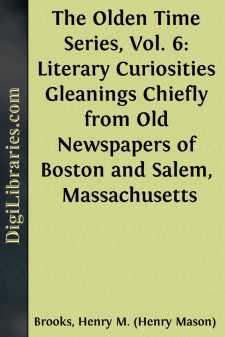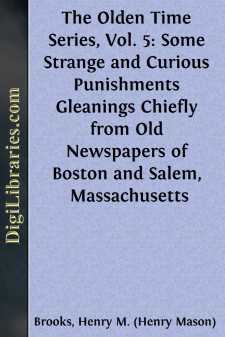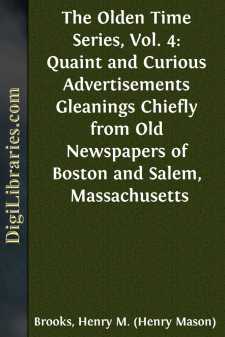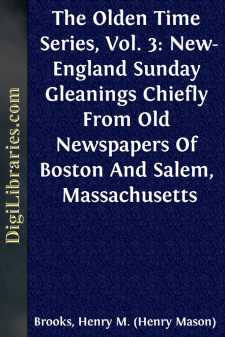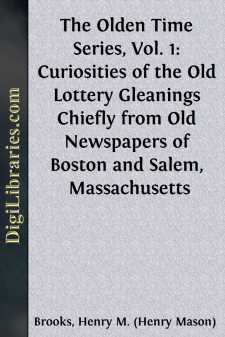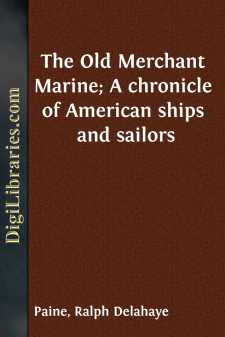History
- Africa 30
- Americas (North Central South West Indies) 50
- Ancient 68
- Asia 58
- Australia & New Zealand 8
- Canada 41
- Caribbean & West Indies 1
- Civilization 20
- Eastern Europe 12
- Europe 310
- Expeditions & Discoveries 60
- General 77
- Historical Geography 1
- Jewish 9
- Latin America 3
- Medieval 8
- Middle East 13
- Military 248
- Revolutionary 8
- Study & Teaching 5
- United States 353
- Western Europe 56
- World 13
History Books
Sort by:
LITERARY CURIOSITIES. The following humorous lines well describe the difficulty that editors find in pleasing the public. They are expected to know everything, and to be able to satisfy all tastes and capacities. No imperfections can be excused in conductors of newspapers; they are not even allowed to be unfortunate. THE EDITOR.That editor who wills to please,Must humbly crawl upon his knees,And kiss...
more...
SOME STRANGE AND CURIOUS PUNISHMENTS. In the month of January, 1761, "Joseph Bennett, John Jenkins, Owen McCarty, and John Wright were publickly whipt at the Cart's Tail thro' the City of New York for petty Larceny,"—so the newspaper account states,—"pursuant to Sentence inflicted on them by the Court of Quarter Sessions held last Week for the Trial of Robbers," etc. In...
more...
CURIOUS ADVERTISEMENTS. Among the mass of advertisements that have appeared from time to time in newspapers are to be found some which are very quaint and curious. Such are not, in all cases, intended by the writers to be so; but they sound so, especially to those persons who have an ear for strange or humorous things. Sometimes, indeed, it is the intention of the writers to attract particular notice...
more...
NEW-ENGLAND SUNDAY. Seeing in an old paper that General Washington was stopped by a "tythingman" in Connecticut in 1789 for the "crime" of riding on Sunday, we were naturally led to think about the "Sabbath question," as it is sometimes called. We find the account referred to in the "Columbian Centinel" for December, 1789. THE PRESIDENT AND THE TYTHINGMAN. The...
more...
INTRODUCTION. While this work does not pretend to be a history, it will yet present many historical facts. Its object is to show from old newspapers, which are not accessible to all, such items and comments upon a variety of subjects as might be supposed to amuse or instruct both old and young. It is not the easy thing that many imagine to examine, read, and select from a vast number of newspapers such...
more...
by:
Buffalo Bill
PREFACE. As we look into the open fire for our fancies, so we are apt to study the dim past for the wonderful and sublime, forgetful of the fact that the present is a constant romance, and that the happenings of to-day which we count of little importance are sure to startle somebody in the future, and engage the pen of the historian, philosopher, and poet. Accustomed as we are to think of the vast...
more...
by:
John Lord
I propose to describe the Greatness and the Misery of the old Roman world; nor is there any thing in history more suggestive and instructive. A little city, founded by robbers on the banks of the Tiber, rises gradually into importance, although the great cities of the East are scarcely conscious of its existence. Its early struggles simply arrest the attention, and excite the jealousy, of the...
more...
by:
Allen Johnson
Chapter I. Pontiac's Conspiracy The fall of Montreal, on September 8, 1760, while the plains about the city were still dotted with the white tents of the victorious English and colonial troops, was indeed an event of the deepest consequence to America and to the world. By the articles of capitulation which were signed by the Marquis de Vaudreuil, Governor of New France, Canada and all its...
more...
CHAPTER I. COLONIAL ADVENTURERS IN LITTLE SHIPS The story of American ships and sailors is an epic of blue water which seems singularly remote, almost unreal, to the later generations. A people with a native genius for seafaring won and held a brilliant supremacy through two centuries and then forsook this heritage of theirs. The period of achievement was no more extraordinary than was its swift...
more...
by:
Punahou School
THE OAHU COLLEGE. In the year 1841, a school was commenced, for the children of missionaries, at Punahou, near Honolulu, Sandwich Islands. Five year ago, it was opened to others besides the children of missionaries. The number of pupils has varied from thirty to sixty, and the whole number of pupils, up to September, 1854, was one hundred and twenty-two. In May, 1853, the Hawaiian Government...
more...


